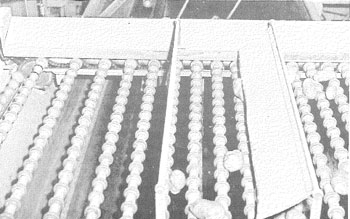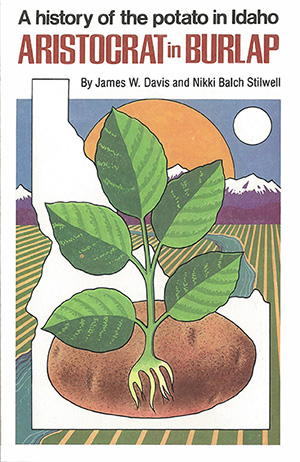 Mechanical sizing facilitated uniformity in package.
Mechanical sizing facilitated uniformity in package.
Carloads of potatoes were sold to cash track buyers or it became a common practice for some Idaho shippers to roll their cars unsold. Once under way on the railroad, the shippers would make a call to a potato broker or commission merchant in Chicago who would endeavor to sell the car there or divert it to another receiving point. Under these conditions, the seller and the buyer had no contact with each other and prior to the development of private brands; the buyer had nothing on which to gauge the quality of his purchase until he unloaded the potatoes at the terminal market.
As buyers began opening cars and sampling shipments, a practice known as stove piping developed at the shipping point in Idaho. A few good potatoes were put in the bottom of the bag, a stovepipe was then inserted in the center section and good potatoes packed around the stovepipe. The space inside the stovepipe was then filled with small potatoes, culls, and a conglomerate of off-grade merchandise that would probably cause the buyer to turn down the shipment if he knew it was present. The pipe was then withdrawn from the burlap bag and a few good potatoes packed on top before the bag was sewn shut. When the prospective buyer opened the bag from the top, he was greeted by the sight of good potatoes. If he chose to slit the side or the bottom in an attempt to find out what the rest of the bag contained, he also found quality merchandise. But when the entire container was unpacked, it had its share of poor-grade potatoes that had been stovepiped into the middle of the bag. This practice was perhaps the darkest day in the history of the Idaho shipping industry in customer relations and an appreciation for quality.
Men such as grower-shipper Joe Marshall are given credit for establishing the principle that quality was an important factor in marketing Idaho® potatoes. Marshall took great pride in his crop and insisted it be handled carefully, and he put only merchandise of which he was proud in bags bearing his brand. It soon became known that the Joe Marshall Blue Diamond brand commanded a premium price in Chicago, California, Kansas City and points east. It was generally accepted that Marshall's potatoes were worth at least an extra 25 cents a hundred sight unseen.
Other shippers soon followed suit when they realized that the introduction of the Russet Burbank had given the state of Idaho a unique product to sell, and quality began to be the watchword of Idaho® potato shippers.


 Mechanical sizing facilitated uniformity in package.
Mechanical sizing facilitated uniformity in package.